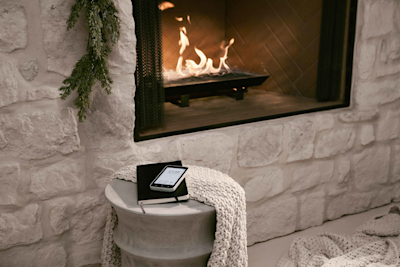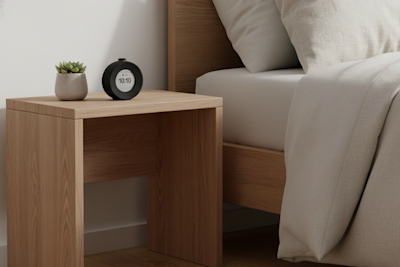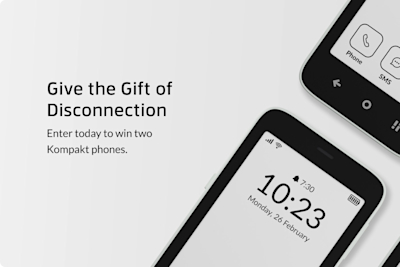
Mudita’s Simple Guide to Digital Minimalism
What exactly is digital minimalism?
The term Digital Minimalism was first popularized by Cal Newport, a professor of Computer Science at Georgetown University. He explained digital minimalism as a philosophy which encourages digital decluttering and helps you find more satisfaction in life. It's about living mindfully in the digital space, not constantly plugged in and always connected. Once you’ve decided to make the move to intentionally disconnect, it's time to do an audit of your digital habits. Once you learn what they are, you'll be able to make changes in how you spend your time. Whether you find yourself constantly scrolling on social media or playing video games, assessing your screen time behavior will allow you to make meaningful changes. When you intentionally unplug, you’ll come to realize there are so many other things which can bring you fulfillment and happiness—things like spending time with friends and family, working out, meditating, reading, or even going outside for some fresh air and taking a walk.
Digital minimalism is about living a more intentional, meaningful life without a constant need to plug in and stay tethered to technology. It's not about getting rid of all your devices or never using them again, but rather deciding how you want to use them so that you can give your time to the things that matter most, instead of wasting it on mindless scrolling and endless notifications.
So, you’ve decided to intentionally disconnect
Once you’ve made the decision to try digital minimalism, the first step to take is to do an analysis of how you spend your time online and how you feel about it.
Are you spending too much time on social media or email? Do certain apps cause anxiety or other negative emotions? What are your digital devices being used for, and how can they be put to better use?
Your digital audit can take various things into account, such as:
Digital decluttering, which means letting go of the things that aren’t useful to you anymore, whether they be social media apps, games, or other apps on your phone.
Swapping out a traditional smartphone for a feature phone, such as Mudita Pure, or a more mindful device, such as Mudita Kompakt
Examine the data you share on the internet, turn off location services on social media and other sites so they don’t know where you are all the time (and therefore don’t show ads).
If possible, get rid of cable TV and streaming services; this will save money while freeing up your schedule!
Removing technology from your bedroom
Once you've done an audit of your digital habits, you can slowly take additional steps to minimize your digital footprint even more. We’d also recommend keeping track of how long you spend online and what sites and platforms you visit. Since our minds can grow accustomed to our routines pretty easily, it’s worth checking in with yourself regularly to determine if our patterns have changed over time.
Decluttering your digital life helps you focus on the things in your life that bring you happiness on a physical level, not just online.
You may find that as you declutter your digital life, you're spending more time with people you love and doing things that bring you happiness.
Spending time outdoors, playing with your pets or children, reading a book—whatever it is that makes you who you are. This new focus can help remind us what's important in life.
All those things are part of the reason why, at Mudita, we do what we do. It's not a chore to live more of our life offline; it’s an opportunity to live more intentionally.
It can be hard to realize just how much time you spend online until you make an effort to disconnect.
It's hard to realize just how much time you spend online until you make an effort to disconnect. The first step is keeping a journal of how much time you spend on your phone, computer, or tablet every day. Make a list of what you're doing with all that time and why it's so important to you. It might be in the form of an activity or hobby—for example, watching YouTube videos or looking at memes—or it could be something more abstract like checking email or scrolling through social media feeds. Once you've identified the activities that take up most of your digital lives and have some idea why they're important (or not), then it's easier to figure out what changes need to be made in order for those changes to stick long term.
Then try setting a timer next time you go online; set it for 20 minutes and see if there are any places where those 20 minutes disappear without warning because of distractions like notifications popping up on your phone or computer screen.
Spending less time online means more time for socializing, exercise and self-care.
Digital minimalism is all about reducing the time you spend online, thereby freeing up more of your life for the things that really matter.
Socializing with friends and family in person.
Getting physical exercise, like running or yoga.
Freeing more time for self-care, like taking a walk, meditating, practicing yoga or another form of exercise.
Disconnecting also helps you get better sleep, which affects nearly every aspect of your mental and physical health.
We all know that being constantly bombarded with information and being constantly connected to people can be exhausting. The digital world can be a wild, wonderful place. However, it's also the enemy of sleep.
With the advent of digital technology and its constant presence in our lives, it's easy to forget that sometimes, its impact has far reaching consequences.
Disconnecting is also good for your sleep, which affects nearly every aspect of your mental and physical health. The less time you spend on digital devices before bed, the better the quality of your sleep will be.
Not only does staying up late on your phone make you groggy in the morning, but it can also affect your circadian rhythm—the natural cycle our bodies go through every 24 hours that regulates when we feel awake or sleepy.
To keep your body feeling refreshed (and help you get a good night's rest), it’s best to remove all technology from your bedroom and replace your smartphone alarm with a traditional alarm clock, such as Mudita Bell or Mudita Harmony.
Digital minimalism is about getting rid of the things online that aren't helping you live your best life so that you can focus on the things that are really important.
Digital minimalism is the art of decluttering your digital life. It's about removing the things that are not necessary for you to live a happy and meaningful life. It’s about focusing on what matters most to you, and getting rid of all that stuff that gets in the way of doing those things.
Digital minimalism is about living a more intentional life without a constant need to plug in order to stay connected to the world around you.
For example: If your relationship with technology isn't benefiting your life, then it's time to let go of it and simplify your digital habits instead!
Time to unplug
Ultimately, digital disconnection isn't just about avoiding screen time, it's also about getting rid of all the clutter and finding more satisfaction in life and less of a need to plug in and stay connected. It may seem like an intimidating task at first, but it's not as hard as you think! Start by decluttering your digital life.
What’s your experience with Digital Minimalism? Let us know in the comments below:
If you enjoyed this article, please check out similar ones featured on our blog and learn more about how living more of your life offline with less distractions can help enhance your health and overall well-being.
To learn more about Mudita, take a look at our website and our other posts. If you enjoyed reading this article, please share and recommend it!
Related stories

Starting the New Year with Fewer Distractions, Not More Tech
A gentle January reset. Start the new year with fewer distractions and learn how mindful tech use can support focus, rest, and more meaningful downtime.

Is 8 hours still the golden rule for sleep?
Eight hours is the recommended average, not a rule. Discover why sleep quality, consistency, and your natural rhythm matter more than hitting a number.

Win the Gift of Disconnection in Our Mudita Kompakt Giveaway
Enter the Mudita Kompakt Giveaway for a chance to win two minimalist E ink phones designed for digital detox, calm, privacy, and presence.
If you'd like to receive the best stories from our blog, keep up to date with our progress and get notified about our product releases and special discounts.